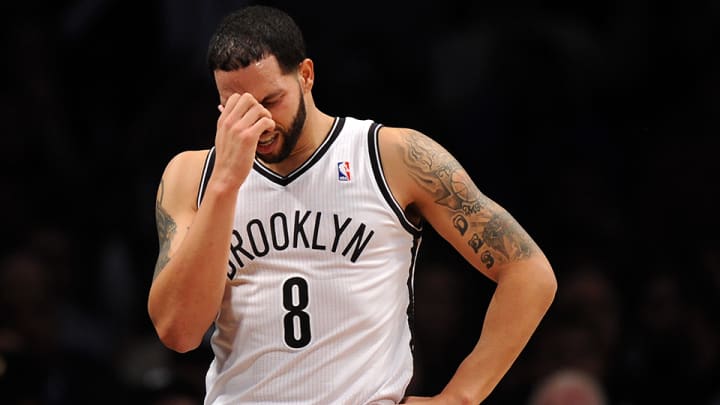Deron Williams signing helps Mavs cope with current circumstances

When Dallas lost the commitment of DeAndre Jordan, it also lost out on the most sensible use of its salary cap space. Every other max-quality free agent on the market had already committed to some other team by the time Jordan flipped. Most every quality big in free agency was spoken for at that point, as were the vast majority of the mid-tier free agents in general.
So the Mavericks, pushed by desperation, searched for more creative use of their cap resources. They looked beyond the free-agent pool to acquire Zaza Pachulia via trade at only the cost of a second-round pick. Dallas, then, found help at point guard in Deron Williams's Brooklyn exodus. Williams joined the Nets as an intended superstar in 2011. He never fulfilled that role. Williams's career with the team had run its course through injury, infighting, and big-picture disappointment—all of which motivated Brooklyn to waive Williams and eat the majority of the $43.4 million he was owed over the next two seasons.
This was a fortunate break for Dallas, which after signing Wesley Matthews and acquiring Pachulia, wouldn't have otherwise had the means to absorb Williams's $21 million salary into its cap space. Instead, the Mavs waited for Williams to clear waivers and then formalized a two-year, $10 million contract that, according to the tone of the reporting, appeared largely prearranged.
Williams, for all his flaws, is a far better player than any Dallas could have found for $5-6 million in free agency. That might come as small consolation in the wake of the DeAndre Jordan fiasco, though moves like this one push the Mavs back into reasonable contention for a playoff spot. Whether Dallas should pursue those ends at all is debatable. Yet with the most intriguing young free agents long gone, Dirk Nowitzki in his basketball twilight, and the Mavs' 2016 protected first-round pick owed to Boston, the practical components of a rebuild are more complicated than they might seem. A deliberate step back would hold little benefit for a team in this position.
Dallas will instead take a swing at being competitive. Even that won't be easy; while the Mavs addressed two positions of need by signing Williams and landing Pachulia, the only true wings set to be healthy at the start of the season are Richard Jefferson and rookie Justin Anderson. Both Matthews and Chandler Parsons are working their way back from major injuries and, given Dallas' middling prospects for the season, should take every precaution before returning. Due to their roster makeup, the Mavs will need to rely on guard-heavy lineups in the interim.
SI.com's 2015 NBA free agent tracker
A bigger, stronger point like Williams who can play off the ball helps in that regard. He'll share backcourt minutes with Devin Harris, J.J. Barea, and Raymond Felton as the situation demands, both in Matthews's absence and through his gradual integration into the lineup. That kind of role should suit Williams. The 31-year-old guard still drove as a means to initiate Brooklyn's offense last season, but diminished athleticism and shaken confidence killed his effectiveness around the basket. Playing alongside drive-oriented guards (and, eventually, a pick-and-roll creator like Parsons) could make Williams's passing and shooting welcome skills in contrast.
Those two-guard looks—supported at small forward by either a rookie or a bit player, mind you—are little more than a stopgap solution. Williams isn't the kind of talent who could elevate Dallas through the injuries of Parsons and Matthews. He can, however, make life slightly easier for Nowitzki and, eventually, the Mavs' returning wings. Williams can run an offense to better efficiency than any other point guard on the roster. He can sop up possessions that would otherwise have overburdened Dirk, whether by shooting from the perimeter or spreading the ball around. He works well enough in pairing with other point guards and gives a shallow Mavs roster another option to play big minutes.
There's value in Williams's signing, even if he can't recontextualize the Mavs' operations in the same way that Jordan would have. The key appeal in Jordan's potential signing was the timeline it projected beyond the 2015-16 season—namely, what a core of Jordan, Nowitzki, a healthy Parsons, and a recovered Matthews might entice in free agency next summer.
- MORE NBA: Grades | Mavs want interior help | Cuban, Ballmer clear air
Williams's addition, by contrast, is a move rooted squarely in Dallas' uninspiring present. The second year of his deal is a player option. If he can play even relatively well and maintain a workable relationship with Mavs coach Rick Carlisle (the latter of which is a notable concern, given the personalities of both men), Williams will be in a position to opt for free agency and a likely raise in 2016.
Dallas would again be without a starting point guard and looking to make use of its considerable cap space—familiar territory, to say the least. Williams is a means for the Mavs to get by until that next reset. Any success in that regard is relative. Williams can play off of Nowitzki, maintain a quality offense, and help ease Parsons and Matthews back into their respective roles. Anything more is beyond him and, by extension, beyond a flimsy roster that can't hope to compete for a title.

Rob Mahoney is an NBA writer dedicated to the minutiae of the game of basketball, its overarching themes and everything in between. He joined the Sports Illustrated staff in 2012.